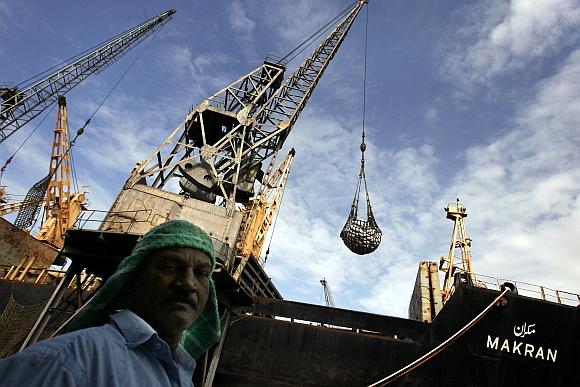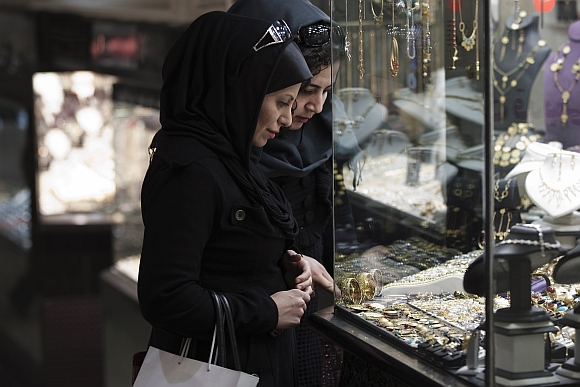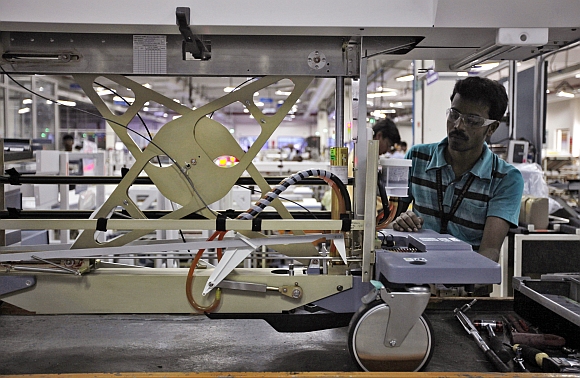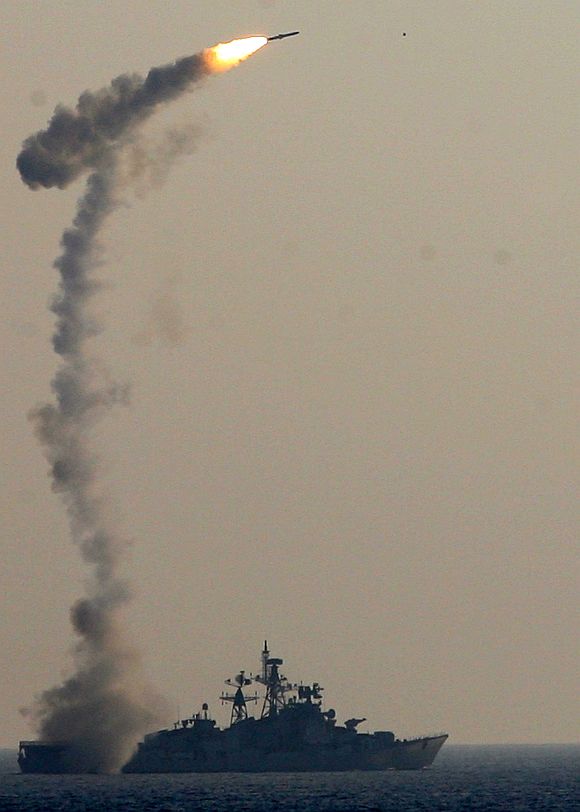Photographs: Arko Datta/Reuters Dr Sunil Khilnani
'Nonalignment 2.0 -- A foreign and strategic policy for India in the twenty first century' -- was released in New Delhi last week.
The document is the product of collective deliberations of Dr Sunil Khilnani, Director, King's India Institute, London; Dr Rajiv Kumar, Director General, FICCI; Dr Pratap Bhanu Mehta, President, Centre for Policy Research, New Delhi; Lieutenant General Prakash Menon (retd), former commandant, National Defence Colle#8805 Nandan Nilekani, Chairman, Unique Identification Authority of India; defence thinker Srinath Raghavan; former foreign secretary Shyam Saran and Siddharth Varadarajan, Editor, The Hindu.
They were administratively supported by the National Defence College and the Centre for Policy Research.
Professor Sunil Khilnani, author of the respected book, The Idea of India, explains the rationale for the document.
The report -- and debate -- is the product of collective deliberations held over 14 months involving a group of citizens, diverse in their backgrounds, interests, and areas of expertise, but all united by a common concern and sense of urgency.
Simply put, that concern rests in a recognition that our nation is at a period of critical choices concerning our internal development and our advance in the world.
Although we will live with the effects of these choices for years, we make too many of them in ad hoc ways, without reference to any agreed strategic principles.
NonAlignment 2.0 is an attempt to identify basic principles that might guide India's foreign and strategic policy over the next decade and beyond. The views it sets out are rooted in the conviction that India's domestic development will hinge greatly on how effectively we manage our global opportunities.
Our intention is not to prescribe specific policies -- that remains the prerogative of government. Rather it's to encourage debate that brings us closer to a strategic consensus and unified approach to our international engagements -- one capable of commanding cross-party support, as well as support from across government and the services, the corporate world, civil society and the media.
Such a strategic consensus is vital if India is to successfully pursue its national development goals in difficult global circumstances.
The purposes of our document are three-fold: To lay out the opportunities that India enjoys in the international sphere; to identify the challenges it is likely to confront; and to define the broad approach that India should adopt as it works to enhance its strategic autonomy in global circumstances that are likely to remain volatile and uncertain for some time to come.
A first premise of our document is that India's social and economic progress is inextricably entwined with how we manage our international environment -- with whether or not we can seize global opportunities and turn them to our developmental goals.
This will become increasingly true as we engage more deeply with the global trade in goods, labour, technology and ideas.
India now has more interests anchored in different parts of the world than ever. In analytic terms, the separation between domestic and foreign policy is therefore a purely formal one.
Instead of categorising choices as either domestic or international, we must consider the global interconnections and trade-offs -- and continually evaluate short-term domestic policy choices in terms of long-term strategic goals.
Please ...
'Within Asia, China is by some way our most sensitive strategic challenge'
Image: People's Liberation Army troopers at Tiananmen Square, BeijingPhotographs: Jason Lee/Reuters
We begin as well in the belief that there must be a long-range continuity in the practice of our international policy: Hence our title, NonAlignment 2.0.
By that we refer not to an old ideology, but to enduring principles. Three in particular: That our actions should not be governed by ideas and goals set elsewhere, that we expand our scope for strategic autonomy, and that we use our accruing national power to build a more just and equitable global order.
These have been defining principles of India's international policy ever since the inception of the Republic. The world has changed drastically since then, but these values remain at the heart of India's global engagements.
The challenge now is to renovate those values for the 21st century.
That means recognising the changed nature of the international domain, and what it implies for the nature of power today. The great binaries that once structured the international arena -- between ideological rivals who shun one another, or between rich and poor nations -- have lost valence.
Power is increasingly diffused and complex in its nature: Alongside superpowers like the US and China, the world will contain more hubs and centres of power than ever before.
Equally, when it comes to our economic interests, these now straddle developing and developed countries.
The strategic perspective set out in our document is defined by two axes, and I will begin with the regional one -- the Asian Theatre. It's our main sphere of action, our natural home, as well as being the globe's economic dynamo -- but the region lacks any settled institutional architecture of inter-State relations or economic governance.
This gives us considerable opportunities to define our place. We shall have to do so, however, amidst the reality of great power competition, as well as ideological rivalry between Asia's competing developmental models.
Within Asia, China is by some way our most sensitive strategic challenge. Given the asymmetries between our respective capabilities and influence, it will take considerable skill to reconcile our desire to cooperate with the realities of competition.
From a strategic viewpoint, we'll need to work to rebalance our relationship in at least two dimensions, security-related and economic. While securing our mountain borders remains important, we need to reorient our security perspective towards the India Ocean region, in order to maximise advantages we have there.
Economically, our trade is skewed: We increasingly import high-value goods, but add little value to the bulk of our exports. Given China's interest in India as a major market for its infrastructure capacities, we need to leverage this in intelligent ways.
Please ...
'We have major interests at stake in West Asia'
Image: Women at a Tehran, Iran, shopPhotographs: Morteza Nikoubazl/Reuters
In South Asia as a whole, we have to work harder to build a common platform. While India is clearly the major economic power in the region, we've failed to parlay this into the political influence and convergence necessary for greater economic interaction.
Deepening South Asia's economic integration serves the interests of all its members.
We need to foreground this as a clear strategic goal, and to make every effort -- including unilateral concessions where necessary -- to secure greater economic integration.
This is the best counter to the ambitions of other great powers, particularly China, who wish to expand their influence in the region.
Pakistan, of course, is a major stumbling block to such integration.
Here we need to pursue simultaneously a variety of policies. We should at all times maintain diplomatic and political engagement aimed at bringing some normalcy to the relationship, while continuing to cope with present and future threats that may emanate from Pakistan-controlled territories.
Our policy initiatives need to offer Pakistan real options to join in the region's economic growth, even as we stay prepared for negative contingencies, should the present equilibrium of instability tip the wrong way.
Finally, we have the uncertain scenario of West Asia, where we have major interests at stake. This enjoins us to develop a more fine-grained set of guiding principles for engagement.
This is particularly true as Western powers become less dependent on the region for energy needs while still using the area as a testing ground for democracy-building and the use of force.
We need to be more nimble in our judgements when the legitimacy of regimes is contested, and to develop more sophisticated arguments about the use of force.
Most of all, we will need to wean ourselves off our energy dependency on the region.
The second strategic axis we consider, after the regional one, is the broader, functional one.
In terms of our engagement with the international order, there are two aspects I'll highlight. First is our growing integration into the global economy, which is vital to our prosperity.
As developed economies lose out in the current global economic readjustment, they will likely become more protectionist. India will thereby have to shoulder the role of advocate for economic openness.
While it may be tempting to enter into bilateral free trade agreements, we must continue to try to build multilateral regimes: This is to our benefit, not least because it helps to embed China in a rule-bound, negotiated, international system.
In fact, the very open-endedness and uncertainty of the global economy provides us with an opportunity.
Please ...
'India has an enormous global footprint'
Image: A GE Healthcare employee at work in BengaluruPhotographs: Danish Siddiqui/Reuters
We need to take a more strategic view of our financial sector and encourage its global orientation, and we need to engage more actively in Asian and global discussion about monetary systems and currency regimes.
A less fragmented, more unified view of our international economic engagements will be one that traces clear linkages back into the domestic economy and electoral considerations.
We need to be able to leverage bargains from one sector to the other; but that requires much greater coordination between the various responsible institutions (ministry of external affairs, ministry of finance, ministry of commerce, the Reserve Bank of India etc) as well as political will to confront veto points in our own politics.
We need also engage more actively with the international institutions of economic governance, in all their tentativeness and proliferation.
In our partnerships, complexity rather than singularity should be the operative mode, in a world where old alliance systems are breaking apart.
India holds a perhaps unique status precisely because of its complex identity, which enables it to straddle many worlds and make many connections. In terms of constitutional vision, India is the most 'Western' and liberal among the non-Western powers. But we are rooted in Asia.
As a poor and developing country, we also have an enormous global footprint. We have the potential to become a technological powerhouse, yet remain an informal economy.
We are committed to democratic practices and are convinced that robust democracies are better guarantee of security. Yet we do not 'promote' democracy or see it as an ideological concept that polarises States.
It follows that there are few 'natural' groupings -- whether defined by political vision, economic profile and interests, or geopolitical security challenges -- into which India easily fits, let alone other individual states it should bind itself to.
This diverse identity and multiplicity of interests is a great strategic asset. For it means that India can be a unique bridge between different interests and worlds.
Please ...
'India's strategic objective must be to emerge as a maritime power'
Image: The supersonic Brahmos missile takes its signature trajectory as it is launched from an upgraded Ranvir class shipPhotographs: The Indian Navy
I turn now to Hard Power. Hard Power will, of course, remain important. But at present, our land borders, subject to several unresolved disputes, offer little scope to project strategic military power. There is only one direction open to us to do so -- towards the Indian Ocean.
The development of military power must therefore be reoriented from a continental to a maritime direction in order to take advantage of our peninsular location.
India's strategic objective must be to emerge as a maritime power.
In tandem with maritime reorientation, we need to revise military doctrines. The fact that all conventional military operations involving Pakistan or China will be conducted under the nuclear overhang means that there are severe constraints on achieving political objectives through conventional war. The risks involved in escalation are real.
The presence of nuclear weapons constricts the traditional utility of military force and calls for a redefinition of our notions of 'victory.' The significant implication is that the longstanding objective of our military doctrine in relation to Pakistan -- the capture of significant swathes of territory, is no longer valid. Instead, we need to develop a hard power strategy with a wider spectrum of options.
This demands a redeployment of resources as well as investment in technological capabilities.
With China, our defensive doctrine also needs to be reworked: Away from a 'mountain strike corps' towards a strategy of quid pro quo. Such a strategy would include the capacity to encourage insurgency in Chinese-occupied areas; the integration of the frontier regions by rapidly improving communication infrastructure; and third, naval expansion that would enable us to dominate the Indian Ocean region.
To achieve these strategic goals, a package of internal service structure reform is required. We should establish a maritime commission, which can coordinate development of capabilities across both naval and civil needs.
The functionality of civil-military relations should be improved by bringing armed forces personnel into the ministry of defence and creating a chairman, joint chiefs of staff housed in the MoD, overseeing regional commands integrated along functional lines.
Energy is a core security issue, and the policies we adopt in relation to it will have a major impact on our strategic autonomy.
We must move from a usage pattern based on imported fossil fuels to one based on renewable and clean sources of energy, and towards a model based on public goods rather than on individual consumption.
Please ...
'A great power is defined by its ability to produce knowledge in all fields'
Image: Nishant, the Unmanned Aerial Vehicle developed by the Defence Research and Development Organisation, is recovered using a parachute after its launch in Kolar, KarnatakaPhotographs: Reuters
Finally, we stress that we view our national security as rooted in our capacities to produce knowledge, create educational opportunity, and expand the frontiers of research.
First, a great power is defined by its ability to produce knowledge in all fields, rather than simply being a consumer of knowledge produced elsewhere.
Second, as India moves up the growth curve, citizens will demand access to education and knowledge as a crucial path to social mobility. Failure to meet such expectations can turn intrinsically positive developments into a national security risk.
We need to establish a knowledge ecosystem, using ICT and leveraging our human and physical capital and economic assets to achieve this strategic goal.
Indeed, failure to reform our knowledge and human capital formation capacities will have serious negative impact on our hard power. Our growing defence spending is virtually all directed to imports: Our own defence research and production as managed by the Defence Research and Development Organisation has delivered below expectations.
Absence of competition, free flow of government funds, and bureaucratic personnel management have been major obstacles. We need to open defence to the private sector, and press for effective technology transfer while also investing in technology which others are unwilling to transfer. We need also to dramatically lower the average age of government scientists.
Additionally, security-related research should be more deeply embedded in our broader research and knowledge structures: Enabling more interaction between defence expertise the private sector and civil society would be of mutual benefit.
Finally, the quality of human capital responsible for national security needs to be rapidly enhanced: Creating a national defence university, and internationalising our defence colleges would be one step.
Ultimately, whether we can expand our strategic options will depend on enhancing State capacity.
Please ...
'We CAN lift millions of our citizens out of poverty'
Image: Saeed, 10, carries his nine-month-old sister Muskaan through an alley in Dharavi, one of Asia's largest slums, in MumbaiPhotographs: Danish Siddiqui/Reuters
While the Indian State's resource base will continue to expand, its effective capacities will depend on redesigning its institutional forms.
In addition to reforms for greater accountability, we need to break away from the present 'silo' structures of the State, whereby knowledge and expertise are segregated along bureaucratic lines.
The fact is that most of the strategic challenges faced by government cut across disciplinary and ministerial boundaries. At the same time, there is hyper-specialisation within knowledge fields, with new sub-fields are rapidly emerging, usually produced by young minds.
It follows that the capacity to synthesise and integrate specialist knowledge will be critical to effective State policy and action.
The government must be therefore willing to break down barriers between 'insiders' and 'outsiders', and to overturn hierarchies based on age.
To conclude: We now have the possibility of lifting millions of our fellow-citizens out of poverty. That remains the guiding principle of any national strategy, and how effectively we realise that possibility will remain the standard by which the world judges us.
To realise this goal, we have argued, enjoins us to engage more deeply in the world -- to play a greater role on the world stage. We need not simply follow the behaviour of other powers. Instead we must establish new standards of leadership.
India's adherence to values is a source of its legitimacy in the international system -- and that itself is a form of power.
As India's global capacities rise, we need to sustain the legitimacy bequeathed by our national movement. Such legitimacy, if squandered, cannot be easily recovered.
India should aim not just at being powerful: It should set new standards for what the powerful must do.
Dr Sunil Khilnani is director, King's India Institute, King's College, London.








article